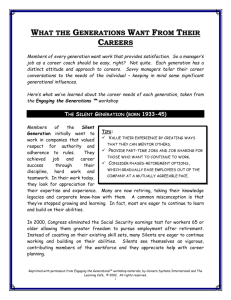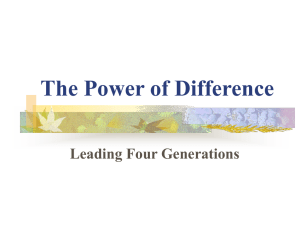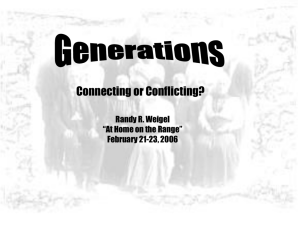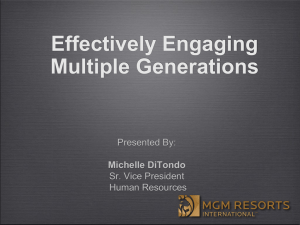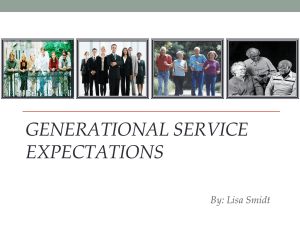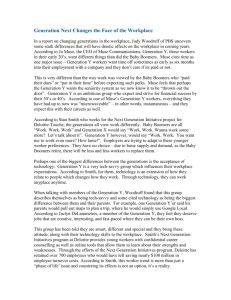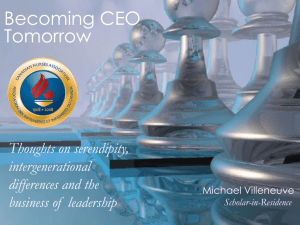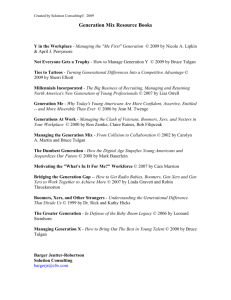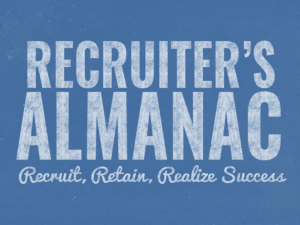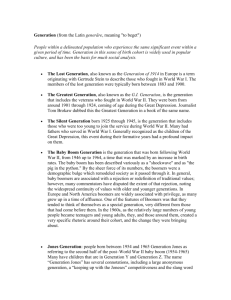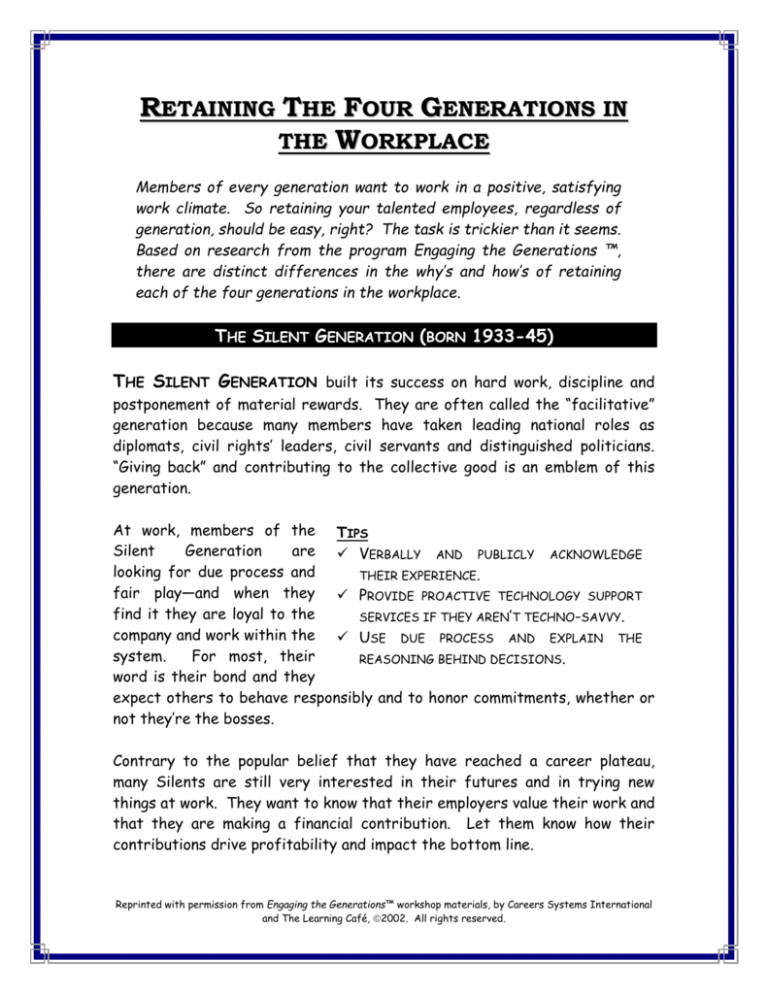
RETAINING THE FOUR GENERATIONS IN
THE WORKPLACE
Members of every generation want to work in a positive, satisfying
work climate. So retaining your talented employees, regardless of
generation, should be easy, right? The task is trickier than it seems.
Based on research from the program Engaging the Generations ™,
there are distinct differences in the why’s and how’s of retaining
each of the four generations in the workplace.
THE SILENT GENERATION (BORN 1933-45)
THE SILENT GENERATION built its success on hard work, discipline and
postponement of material rewards. They are often called the “facilitative”
generation because many members have taken leading national roles as
diplomats, civil rights’ leaders, civil servants and distinguished politicians.
“Giving back” and contributing to the collective good is an emblem of this
generation.
At work, members of the TIPS
Silent
Generation
are VERBALLY AND PUBLICLY ACKNOWLEDGE
looking for due process and
THEIR EXPERIENCE.
fair play—and when they PROVIDE PROACTIVE TECHNOLOGY SUPPORT
find it they are loyal to the
SERVICES IF THEY AREN’T TECHNO-SAVVY.
company and work within the USE DUE PROCESS AND EXPLAIN THE
system.
For most, their
REASONING BEHIND DECISIONS.
word is their bond and they
expect others to behave responsibly and to honor commitments, whether or
not they’re the bosses.
Contrary to the popular belief that they have reached a career plateau,
many Silents are still very interested in their futures and in trying new
things at work. They want to know that their employers value their work and
that they are making a financial contribution. Let them know how their
contributions drive profitability and impact the bottom line.
Reprinted with permission from Engaging the Generations™ workshop materials, by Careers Systems International
and The Learning Café, 2002. All rights reserved.
THE BABY BOOMER GENERATION (BORN 1946-64)
BABY BOOMERS grew up with idealistic longings and changed the social
structure of the country. They created a place for themselves in history as
rebels who initiated many
causes: civil rights, nuclear
TIPS
disarmament,
consumer
SEND THE MESSAGE THAT LONG HOURS AT
advocacy
and
women’s
WORK AREN’T NECESSARILY A BADGE OF
rights.
And when they
HONOR.
joined corporations, Baby
REDESIGN THEIR JOBS TO PROVIDE
Boomers
took
their
FLEXIBILITY.
priorities of change with
SPOTLIGHT PERSONAL FULFILLMENT,
them and made their
MEANINGFUL WORK, INTANGIBLES.
organizations their new
causes.
Baby Boomers are famous for being process-oriented and relationshipfocused at work. As a group, they have been optimistic corporate citizens
who dislike conformity and rules. They are hard workers who strive to do
their very best and are willing to take risks.
Perhaps more than any other generation, they want to make a contribution to
their clients and their companies. The workplace is often a place to find
personal fulfillment and purpose. Baby Boomers need personal satisfaction
from their jobs. Provide praise and recognition. Allow for flexibility so that
they can balance family and work responsibilities.
GENERATION X (BORN 1965-76)
GENERATION XERS entered the workforce during volatile economic times
and amid turbulent world
affairs. They watched their
parents cope with massive
corporate layoffs and job
insecurity. When Generation
Xers went to work, there
TIPS
RESIST MICROMANAGING THEM.
PROVIDE FLEXIBLE WORK ENVIRONMENTS
(I.E., TELECOMMUTING, FLEX-TIME).
REWARD THEIR INITIATIVE.
Reprinted with permission from Engaging the Generations™ workshop materials, by Careers Systems International
and The Learning Café, 2002. All rights reserved.
wasn’t a corporate welcome mat waiting for them, so they have reacted to
the work world as they found it.
Generation Xers are seeking the same control over their corporate lives that
they experienced as children and young adults. Many tend to be outputfocused and outcome-oriented. They are seeking balance in their lives.
They’ve observed workaholic Baby Boomers and are choosing to live and work
differently.
Generation Xers want to know that they can remain widely employable while
pursuing a career with a single organization. Communicate frequently and
truthfully about how the company is performing. Provide feedback on their
job performance.
Provide learning and development opportunities to
increase their sense of employability. Allow for work/life balance and
provide situations where they can try new things.
THE MILLENNIAL GENERATION (BORN 1977-98)
MILLENNIALS are being raised in the most child-centric time in U.S.
history. Studies show that their Gen Xer parents are rejecting the benign
neglect practiced by their
own parents. And those Baby TIPS:
Boomers who waited until
later in life to have their PERSONALIZE THEIR WORK – ONE SIZE
DOESN’T FIT ALL.
children are giving parenting
their formidable all. So this MAKE THEIR WORK INTERACTIVE, LIKE
THEIR TECHNOLOGY, AND GROUP ORIENTED,
offspring
enters
the
LIKE THEIR SOCIAL PREFERENCE.
workplace
as
the
best
educated, most technically COMMUNICATE THE CIVIC SIDE OF YOUR
COMPANY.
literate and most doted upon
of any generation at work.
The Millennial generation brings together the “can do” ethic of the Silents,
the teamwork approach of the Boomers, and even greater technical savvy
than that of the Generation Xers. They may be the first generation in some
time that readily accepts older leadership. They’re looking for careers and
stability.
Reprinted with permission from Engaging the Generations™ workshop materials, by Careers Systems International
and The Learning Café, 2002. All rights reserved.
To attract and keep them, be clear about your goals and expectations,
communicate frequently, provide supervision and structure, establish
mentoring programs, honor their optimism and welcome and nurture them.
They want to be happy at work and are seeking organizations that are
friendly in nature. Millennials are at ease in teams.
For More Information:
900 James Avenue , Scranton, PA 18510
Phone: (800) 577-6916 Fax: (570) 346-8606
HQ@csibka.com
Reprinted with permission from Engaging the Generations™ workshop materials, by Careers Systems International
and The Learning Café, 2002. All rights reserved.

